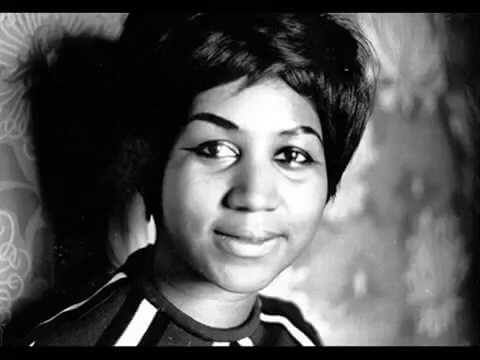What’s your favorite Aretha Franklin song?

Join the discussion...

In honor of the Queen of Soul: What’s your favorite Aretha Franklin song?
Aretha Franklin’s greatness and influence cannot ever be overstated—though we’ll try to give her her propers here anyway—nor replicated. In 1967, the Queen Of Soul took Otis Redding’s demand for “” in a relationship and turned it into a civil rights clarion call. The very next year, Franklin crafted her own feminist anthem, Aretha Now’s “Think,” which solidified her status as a musical icon (but was her ascent ever in doubt?). At just two minutes and change, “Think” features some of the tightest brass and percussion arrangements ever, as well as a rousing call-and-response with her backup singers. But Franklin obviously owns this song, gliding up and down the scales to capture the emotional range of the lyrics, which she wrote with then-husband Teddy White. “Think” is a mix of amused exasperation and fierce resolution; to borrow a more contemporary phrase, it’s about doing better once you know better. And no one could deliver that message more lovingly—or forcefully—than Franklin. [Danette Chavez]
There are few pop music figures who managed to both contribute to and reinterpret the American songbook the way Aretha Franklin did. She cut the saccharine out of “”; like Danette mentioned, “Respect” was already a killer Otis Redding single before Franklin improved it by unlocking the lyrical subtext. It didn’t matter how closely associated a tune was with the other artists who’d performed it: , making “Rolling In The Deep” sound every bit like it was cut in Muscle Shoals. And you can only ever imagine hearing “The Weight” in the many voices of The Band until you hear Franklin’s take, which draws the boogie out of the original’s country-rock shuffle and takes its Biblical imagery back to church. She sings the hell out of the thing, adding melismatic flourishes to the chorus and hitting that cathartic “Yeah!” right before the fadeout. The late producer Jerry Wexler eventually regretted bringing the song to Franklin, dismissing the cover as a crass attempt at a crossover hit, but I don’t hear it—especially not over those punchy horns. Take a load off, Jerry: Aretha could carry “The Weight,” and then some. [Erik Adams]
Aretha Franklin’s scene in the seminal 1980 musical The Blues Brothers is a high-water mark in a film where every number threatens to top the one before it. The only female-focused musical moment in the whole movie, “Think” stands out even among greats like James Brown and Ray Charles, with Franklin staging a showstopping musical rant against the foolish man (Matt “Guitar” Murphy) who’s about to leave her and the greasy spoon that they run together on the South Side of Chicago. Even Jake and Elwood can’t resist joining in with the backup dancers, and who can blame them: They may be on Matt’s side, but ultimately, they’re music fans and know a goddess when they see one. It marks one of Aretha Franklin’s very few acting roles (in addition to a Room 222 guest spot and an encore in the Blues Brothers’ ill-received sequel), so we can be grateful to The Blues Brothers for preserving this three-minute slice of Queen Of Soul perfection. [Gwen Ihnat]
“Say A Little Prayer” has never failed to move me. Even as a kid, there was something about the way Aretha gently builds from the opening to the refrain, from seemingly calm and free-spirited to as passionate as anyone has ever sounded. It’s one of those musical moments that feels timeless because the right singer got her hands on it—if you read the recent New York Times deep dive on , you know that very often demo tracks will cycle through many, sometimes even dozens, of singers before it finds its way into the hands of the person who just makes it sound right. And it’s astonishing how often Aretha Franklin was the right person to sing a song. And for me, she was never as right for the material as she is with this one: From reminding the unnamed target of her words that she’s still thinking of them (even on the bus or during her coffee break at work), to realizing she’s waiting for them to say “I love you, too,” it’s the kind of simple sentiment that too often devolves into schmaltz. But she gives it an air of power. [Alex McLevy]
In the end, Aretha Franklin will be remembered as an uplifting figure, thanks to her iconic empowerment anthems “Respect” and “Think,” both of which have already been discussed in this Q&A. But she also found the power in being broken down and in need of mending. That ache, of broken limbs long since stitched back together, comes through clearly on her cathartic 1970 album Spirit In The Dark, where Aretha grappled with the many men—fathers, deacons, managers, promoters, boyfriends, husbands—who had hurt her throughout her life. Franklin’s music is frequently described in terms of church, but “Don’t Play That Song” takes that voice to the barroom, where Franklin begs an anonymous “mister” to turn off a song because “It brings back memories/The days that I once knew/The days that I spent with you.” There’s an element of victimhood in the way Aretha describes the doomed relationship that comes flooding back to her every time she hears this one song. But the defiance in her voice rises with every belted exclamation of “You lied!,” until the lament becomes a spell of protection, and it’s clear that while this man may have broken Aretha’s heart once, he’ll never get close enough to do it again. [Katie Rife]
GET A.V.CLUB RIGHT IN YOUR INBOX
Pop culture obsessives writing for the pop culture obsessed.